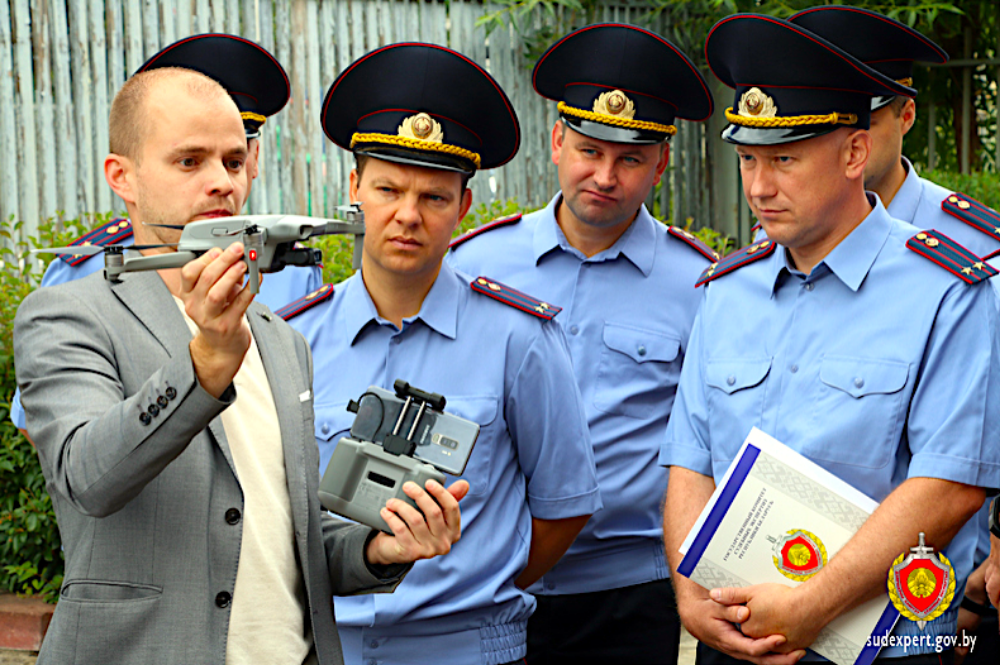The EU has bought 15 surveillance drones for Belarusian authorities, prompting alarm they could be used against pro-democracy protesters. Lithuanian police handed over the equipment to the Belarusian State Committee for Forensic Science on 16 September – in the middle of a brutal police crackdown, which has seen thousands of people snatched off the streets, beaten, and tortured.
And the EU foreign service paid for them out of an €850,000 neighbourhood project being handled by Latvia and Lithuania. The security cooperation appeared to go against the EU’s vocal support for the pro-democracy movement. And opposition activists feared the drones could be used against them, for instance, to identify individual protesters, leading to arrests.
They would be flown “not only in the capital, but also in the Minsk, Vitebsk, and Grodno regions”, the Belarusian forensic committee said on its website. And each one was “equipped with photo and video equipment that will allow you to qualitatively depict the scene and … significantly help in the investigation of criminal cases”, the Belarusian committee said.
For its part, Lithuania said the drones were delivered in September due to “contract procedures”. But Vilnius “suspended all payments to the Belarusian side related to joint EU-Belarus projects as of 9 August”, when the protests broke out.
The drones had not been used for anything yet, the EU foreign service added.
“According to information received from the Lithuanian programme authorities, the light drones were delivered but have not been put into operation,” it told EUobserver.
And they could not be used against protesters anyway, it said.
“Due to their technical characteristics, it is apparently not possible to use these drones to identify individuals as they are specialised in large crime scene investigation,” the EU foreign service said. Under “contractual obligations”, Belarusian authorities were meant to use them only for “project objectives”, the EU also said. It mentioned “catastrophes, natural disasters, ecological disasters”.
But Latvia, Lithuania, and Belarus highlighted different applications.
The drones were to be used for “border protection, help during disasters and accidents”, a Latvian diplomat said. They would be used for “surveillance of border-line areas and providing forensic expertise in criminal investigations,” a Lithuanian diplomat said. And they would “help during the inspection of man-made and natural accidents, traffic accidents, search for people in the woods”, the Belarusian forensic committee said.
Project objectives
“Of course … that equipment needs to be used only for the reasons it has been provided”, the Latvian diplomat said. “We do hope that the drones will be used according to their purpose,” the Lithuanian diplomat said. “The European Commission … will keep closely monitoring the programme and the project’s implementation,” the EU foreign service added.
But for one Belarusian activist, who asked not to be named for security reasons, the EU words provided little comfort.
“Who can prevent the use of these drones to disperse protests?”, he told EUobserver when the project came to light. “The excuses that it’s not the police, but forensic experts look pathetic … Do they [the EU] have any conscience or brains?”, he said.
Clarification
Lithuania has clarified its role in the purchase of surveillance drones for Belarusian authorities. Lithuanian authorities wired the funds for the 15 drones to Belarusian ones under an EU programme, a Lithuanian diplomat said. But Lithuania did so on 8 May, well before the eruption of pro-democracy protests in Belarus on 9 August.
“There was no physical launching of the project and the Belarus counterparts of the project bought the drones themselves,” the diplomat said.”Lithuanian police did not take part in buying and delivering the drones to Belarus and they did not provide any training or guidance”, she added.
Lithuanian police also told national media Belarus had spent €40,000 on the equipment and had received them on 28 August.
But when asked which firms supplied the drones, neither the Lithuanian diplomat nor the police were in a position to say.
EUobserver’s original enquiries about the project had indicated that Lithuanian police handed over the drones in September, after the pro-democracy protests in Belarus had begun, despite a risk they could be used against demonstrators.
And the report caused recriminations in Lithuania, which is preparing for elections this weekend and where the incumbent prime minister is an ex-police chief.
For its part, the EU foreign service, whose money paid for the drones, declined to give further details.
And the Lithuanian diplomat noted that “already a month ago, the Lithuanian ministry of interior has addressed the [European] Commission for more information and more details concerning cooperation with Belarus and application of EU rules. As far as we know, the answer is due on 8 October”.
Source: euobserver

